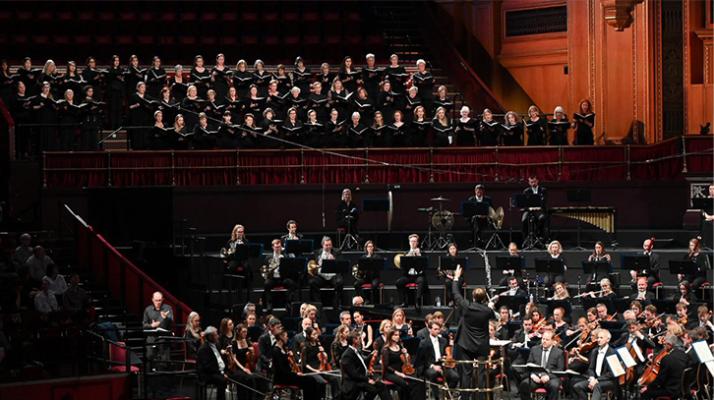Guest blog: See the music
Paul Whittaker OBE discusses the value of having sign language interpreters at performance venues, how music can be seen as well as heard, and ways music groups can create an inclusive environment for Deaf people.
No doubt many of you have seen sign language interpreters in action at meetings, conferences and on TV. Perhaps you’ve also seen them in a theatre. But how often have you come across them in a concert hall?
Although I was born Deaf, music has always been vital to me. I play the piano and organ, read music at Oxford (after being rejected by 12 other universities due to my deafness), took a postgraduate course at the RNCM, then ran a charity promoting music and deafness for 27 years. For the past seven years, I’ve been working freelance, focusing mainly on Signed Song and BSL access to classical music.

Paul Whittaker OBE. Credit: Michaela Walshe Photography
It’s very likely that within your own choir, orchestra or ensemble – and certainly your audiences – you have people with a hearing loss. Almost one in five UK adults has a hearing loss, and that figure is rising. Yet deafness is something that people rarely acknowledge; there’s an embarrassment, a shame almost, in admitting you’re losing your hearing. You get your eyes and teeth tested regularly, so why not your hearing, too?
It’s very likely that within your own choir, orchestra or ensemble – and certainly your audiences – you have people with a hearing loss.
I wish I knew why the classical sector is so slow – sometimes seemingly reluctant – to consider access for Deaf people. I admit that there are very, very few interpreters who have the musical background and knowledge to successfully sign classical concerts, but such people can be found. Many orchestras and venues do provide BSL for schools and family concerts, yet hardly any follow that up by having interpreters for their main concert series. It makes no sense to get people into your venue, dangle the carrot and then take it away.
It’s been wonderful seeing the recent examples of the Royal Liverpool Philharmonic Orchestra (RLPO) and the Royal Philharmonic Orchestra (RPO) providing BSL interpretation. I was fortunate enough to join the RLPO for Bach’s St John Passion in April. RPO asked me to do Britten’s War Requiem for them in May, which was attended by several Deaf people who had never been to a classical concert before.

Paul Whittaker OBE (bottom left) in a concert with the Royal Philharmonic Orchestra, Philharmonia Chorus and conductor Vasily Petrenko. Royal Albert Hall, May 2022. Credit: RPO/Mark Allen
These are just two examples, but the list of what I consider to be proactive, committed organisations and venues is still pitifully small. So, what can you do to change this? Booking an interpreter to sign your concert is the obvious thing (and I’d be happy to oblige) but do take time to consider what repertoire works for a first-time Deaf audience. You won’t get many people coming to Carmina Burana, for example! Try and engage with your local Deaf community and with BSL students. If possible, arrange an activity beforehand where Deaf audience members can meet the players and find out more about the music being played.
Many hearing people express their appreciation at the beauty of sign language and how it conveys the music, the lyrics and the message. Music can be seen as well as heard.
Within your own organisation, try and encourage people to be open about their level of hearing. You can easily spot this by noticing when someone turns their head in order to listen to the speaker or conductor. Try and foster a welcoming environment where people are not ashamed to admit to having a hearing loss; you’ll be surprised how many people confess to struggling. Be patient too; lip-reading is hard (only 30% of English is lip-readable), the environment may be noisy and not everyone projects their voice well.
Providing a BSL interpreter isn’t just for Deaf people, either. Many hearing people express their appreciation at the beauty of sign language and how it conveys the music, the lyrics and the message. Music can be seen as well as heard. Let’s learn to listen with our eyes as well as our ears.
Find out more about accessibility for Deaf people by attending our event - Conversations about inclusion: on Deafness and hearing loss with Paul Whittaker (online event)
Find out more about Paul Whittaker OBE on his website. For upcoming engagements, check his Facebook and Twitter pages.

